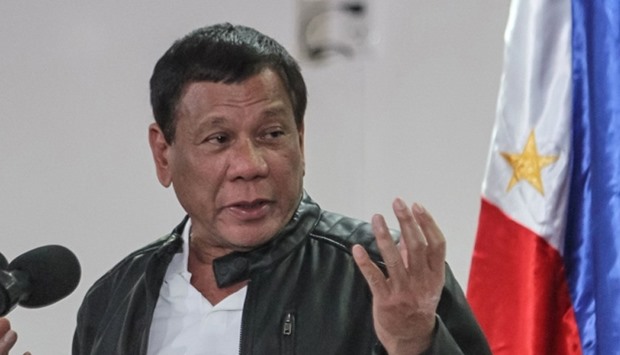Philippine President Rodrigo Duterte said Wednesday a three-month battle against Islamic State group supporters occupying parts of a southern city was in its ‘final stages’.
Duterte gave his assessment shortly after government troops secured a vital bridge in Marawi city, allowing them easier access into areas being held by the militants.
‘We are in the final stages. So let us send immediately, even air-lift, the police,’ to Marawi, Duterte said in the capital Manila, about 800 kilometres (500 miles) to the north of the battle zone.
Pro-IS gunmen occupied parts of Marawi, the Islamic capital of the mainly Catholic Philippines on May 23, triggering a battle that the military says has left almost 800 people dead.
The fighting, which has included a US-backed air campaign against the militants, has destroyed large parts of Marawi.
Duterte and security analysts have said the militants carried out the assault in an effort to establish a Southeast Asian base for IS.
Duterte on Wednesday warned that, even with the Marawi battle over, the militants could still launch attacks elsewhere in the Philippines, particularly in the strife-torn south where the country's Muslim minority is based.
The southern regions of the Philippines have long been troubled by armed Muslim bands including separatist guerrillas and outlaws, some of whom have gravitated towards IS.
Duterte said other southern cities with large Muslim populations, including his hometown of Davao, were vulnerable. He said Manila might also be a target.
Duterte imposed martial law across the southern third of the Philippines immediately after the militants occupied parts of Marawi to combat the security threat.
Hours before Duterte spoke, soldiers in Marawi secured the Mapandi bridge, a vital supply route which had once been menaced by militant snipers and rocket-propelled grenades.
Soldiers marched across the bridge on Wednesday in large numbers, although gunfire could still be heard nearby.
Military spokesman Brigadier General Restituto Padilla said there were only about 40 militants left in Marawi, confined to a space about half a square kilometre wide.
But Padilla warned there were many buildings in that space where they could be hiding, while a local commander said fierce fighting was still to be expected.
‘Every inch of the buildings that we take, they resist,’ Brigadier General Melquiades Ordiales told reporters who accompanied the soldiers across the bridge.
The militants have been able to withstand the military assault, which has included a relentless US-backed bombing campaign, by hiding in tunnels and bunkers.
They are also believed still to be holding hostages, including a Catholic priest.

